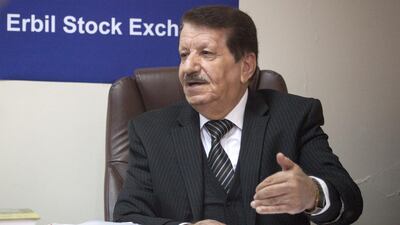The Erbil Stock Exchange (ESX) aims to be up and running in a few months time. Here, Abdullah Abdulraheem, the chairman of the ESX, talks exclusively to The National about the exchange and his plans.
How close are you and your team to the launch of the Erbil Stock Exchange?
We are in the final quarter of the set up stage but, of course, it has been a long process. It was first raised in 2007 and 2008 by [Massoud Barzani, the president of Iraqi Kurdistan], who wanted to know if we could launch a joint exchange with Baghdad. We held two or three conferences and decided that there was room for a new stock exchange in Iraq aside from the ISX [Iraq Stock Exchange]. We are now looking at a launch at the end of August or September.
What is the reason for the delay?
We are a little bit delayed but this was for our own sake. Due to our lack of knowledge we asked for assistance, which I think will attract more international investors. We are in a better position now, and I think that is good for all sides. We have asked for assistance from Nasdaq OMX and on February 21 the their team will arrive in Erbil and bring a copy of the system here to be installed. Their staff will train our staff for two weeks. By the end of July they will hand over the system to us. We need one or two months to get ready after that.
What are your expectations in terms of initial public offerings?
We don’t expect to have a lot of IPOs in the first year. I expect between five to 10 in the first year. We have identified various sectors: we have two or three banks, two or three companies in agriculture and some in the industrial sector. And going forward, we have many international oil companies in the Kurdistan region that we will try and attract too, to get them involved. I do not believe this is [too ambitious]. [The UAE’s] Emaar could be listed both here and in Dubai, for example, and [Shrajah-based] Dana Gas as could [firms such as] Pepsi [in Erbil and New York].
Will the ISX and ESX be rivals?
For sure, each stock exchange would like to be the winner and both of us would like to keep the companies that are listed on our exchanges. My expectation is that there are about 85 companies that are listed on the ISX that would be keen to cancel their listing there and join the ESX. But we would like to take part or contribute to the boom of the Iraqi economy in general.
Is there another stock exchange that the ESX has looked at to imitate?
Of course, if we imitate anyone we would want to imitate the successful ones. Last year we had a field visit to Dubai. We stayed about three or four days and had a look at how it works. At the end of our visit we signed a [memorandum of understanding].
What kind of investors are you targeting at the ESX?
Our goal is to bring in money, which is not invested, to flush it into the market. We want to attract both retail and institutional investors, of course, but one of the reasons that many people keep their cash at home and don’t like to deposit it in banks because of their beliefs – they think it is not right, under Sharia for example – we’d like to persuade them otherwise. But the second goal is to make it a channel to bring in international investment in the region. We want international, non-Iraqi investment through this. There is a stable situation here in Kurdistan, unlike the rest of Iraq. We don’t want people to hesitate to invest here.
Is it difficult to persuade family-owned companies to go public?
It is not easy but we are trying to convince them. We want to convince them through the media, and so on that by going through IPOs and becoming joint stock companies you can raise a lot more funds and you can create jobs also.
What do you see as the role of the ESX in the economy of Iraqi Kurdistan more generally?
It is important for the economy more generally of course; this is a good qualitative step. It’s a turning point.
business@thenational.ae

